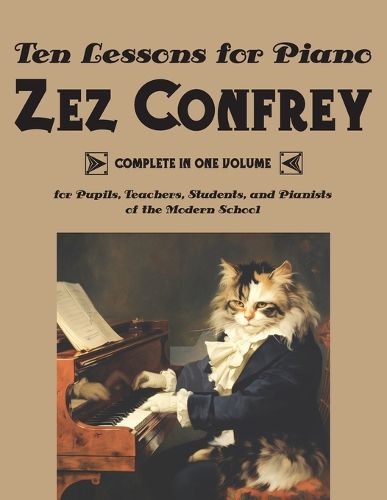Readings Newsletter
Become a Readings Member to make your shopping experience even easier.
Sign in or sign up for free!
You’re not far away from qualifying for FREE standard shipping within Australia
You’ve qualified for FREE standard shipping within Australia
The cart is loading…






This title is printed to order. This book may have been self-published. If so, we cannot guarantee the quality of the content. In the main most books will have gone through the editing process however some may not. We therefore suggest that you be aware of this before ordering this book. If in doubt check either the author or publisher’s details as we are unable to accept any returns unless they are faulty. Please contact us if you have any questions.
In the 1920s, novelty piano playing was all the rage, made popular by Victor Records and the Q.R.S. player-piano rolls that people enjoyed all across America. The prime composer of this music was piano genius Zez Confrey, who wrote his Ten Lessons for Piano for musicians who wanted to play in this new, jazzy style. The course was in print for decades, and thousands of copies were sold. Unfortunately, the course was printed on cheap paper that would soon become damaged and then discarded. Today, the course is almost impossible to find. For that reason, Waking Lion Press has republished this classic work that will keep your toes tapping and your fingers flying across the keys.
Confrey wrote, "In the preparation of this volume. the author had two aims in view: first, to produce a series of lessons that would, with proper application and study, develop the technical ability of the student to a marked degree; and second, to embody in each lesson sufficient musical attraction to eliminate the monotony usually associated with studies that may have been created for a similar purpose. Anyone with a rudimentary knowledge of piano playing may pursue these lessons with definite results: time-worn methods usually employed to attain such results have been avoided.
"The author hopes that this work will be accepted by his many friends as a tribute to their helpfulness, and that its object, which is to be of real benefit to his co-pianists, be realized. If these results are achieved, he will feel well satisfied with his effort."
$9.00 standard shipping within Australia
FREE standard shipping within Australia for orders over $100.00
Express & International shipping calculated at checkout
This title is printed to order. This book may have been self-published. If so, we cannot guarantee the quality of the content. In the main most books will have gone through the editing process however some may not. We therefore suggest that you be aware of this before ordering this book. If in doubt check either the author or publisher’s details as we are unable to accept any returns unless they are faulty. Please contact us if you have any questions.
In the 1920s, novelty piano playing was all the rage, made popular by Victor Records and the Q.R.S. player-piano rolls that people enjoyed all across America. The prime composer of this music was piano genius Zez Confrey, who wrote his Ten Lessons for Piano for musicians who wanted to play in this new, jazzy style. The course was in print for decades, and thousands of copies were sold. Unfortunately, the course was printed on cheap paper that would soon become damaged and then discarded. Today, the course is almost impossible to find. For that reason, Waking Lion Press has republished this classic work that will keep your toes tapping and your fingers flying across the keys.
Confrey wrote, "In the preparation of this volume. the author had two aims in view: first, to produce a series of lessons that would, with proper application and study, develop the technical ability of the student to a marked degree; and second, to embody in each lesson sufficient musical attraction to eliminate the monotony usually associated with studies that may have been created for a similar purpose. Anyone with a rudimentary knowledge of piano playing may pursue these lessons with definite results: time-worn methods usually employed to attain such results have been avoided.
"The author hopes that this work will be accepted by his many friends as a tribute to their helpfulness, and that its object, which is to be of real benefit to his co-pianists, be realized. If these results are achieved, he will feel well satisfied with his effort."